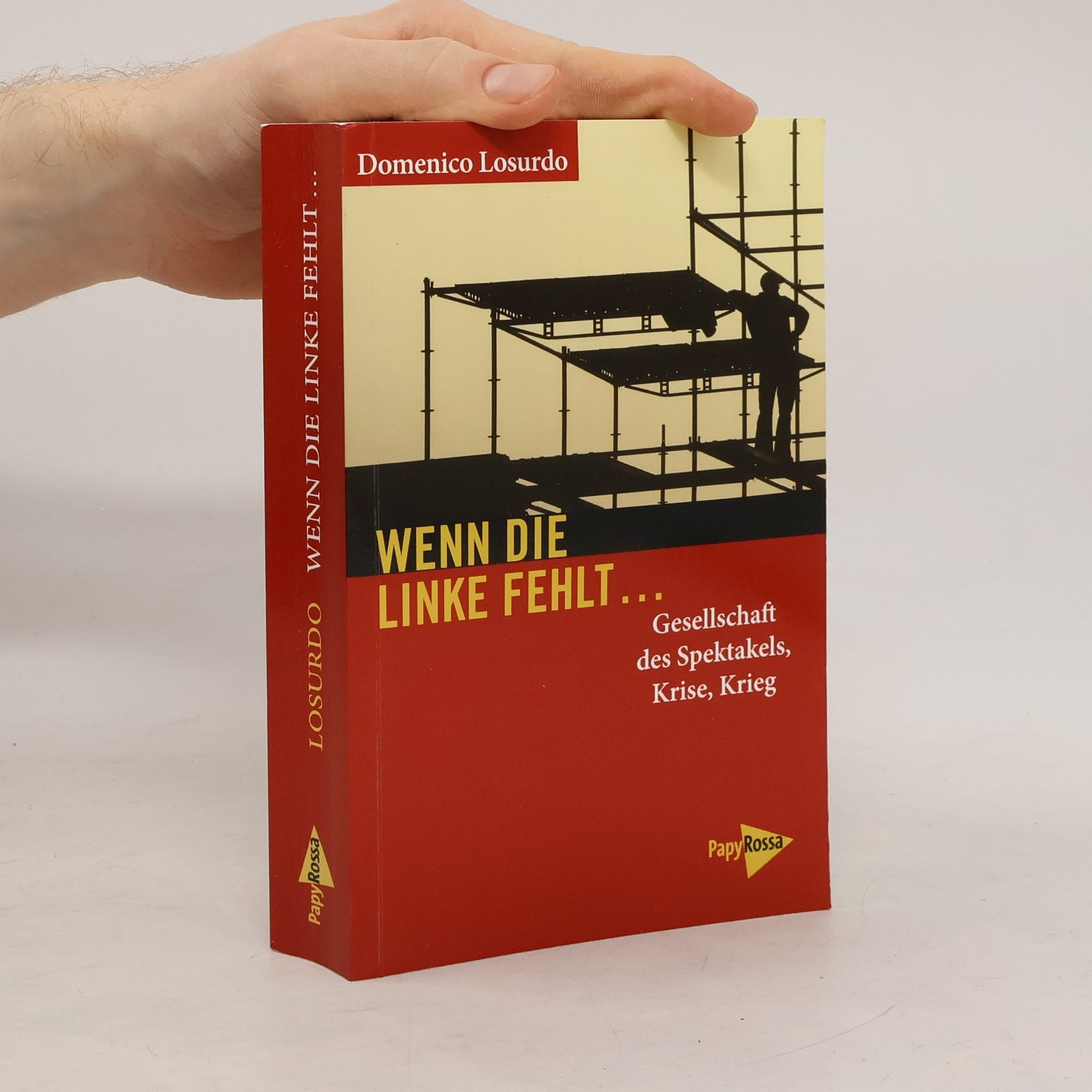The book offers a sharp critique of Western Marxism, highlighting its alignment with imperialist ideologies. It contrasts this perspective with a growing anti-imperialist movement, arguing for a reevaluation of Marxist principles in light of contemporary global struggles. Through this analysis, the author seeks to illuminate the contradictions within Western Marxist thought and advocate for a more authentic anti-imperialist stance.
Domenico Losurdo Book order (chronological)
Domenico Losurdo was an Italian Marxist philosopher and historian whose work centered on a critique of anti-communism, colonialism, and imperialism. He explored the European tradition of liberalism and the concept of totalitarianism, offering fresh perspectives on crucial political and philosophical inquiries. His analyses often drew from a deep study of dialectical thought, bridging Hegel and Marx. Losurdo's writings thus represent a significant contribution to understanding modern political ideologies and their historical underpinnings.






Democracy or Bonapartism
- 304 pages
- 11 hours of reading
HOW AN IRON FIST DONNED DEMOCRACY'S VELVET GLOVE
Der Kommunismus
Geschichte, Erbe und Zukunft
Eine Welt ohne Krieg
Die Friedensidee von den Verheißungen der Vergangenheit bis zu den Tragödien der Gegenwart
Domenico Losurdo zeichnet eine faszinierende Geschichte der Idee des Friedens von der Aufklärung und der Französischen Revolution bis in die Gegenwart mit ihren Kriegsgefahren nach. Diese Geschichte, deren Protagonisten die großen Intellektuellen (so Kant, Fichte, Hegel, Constant, Comte, Spencer, Marx, Engels, Popper) und einflussreiche Staatsmänner (wie Washington, Robespierre, Napoleon, Wilson, Lenin, Bush Sr.) sind, führt zu den dramatischen Problemen unserer Zeit: Ist es möglich, eine Welt ohne Krieg aufzubauen? Ist die Demokratie eine echte Garantie für den Frieden oder kann sie zu einer Ideologie des Krieges werden? Wie und unter welchen Umständen kann der Universalismus in einen Anspruch auf Überlegenheit und Weltherrschaft umschlagen? Das Nachdenken über die Verheißungen, die Enttäuschungen und die Wendungen in der Geschichte der Idee des immerwährenden Friedens ist nicht nur wichtig, um die Vergangenheit zu verstehen, sondern auch, um erneut den Kampf gegen die wieder wachsende Gefährdung des Weltfriedens aufzunehmen.
Der westliche Marxismus
Wie er entstand, verschied und auferstehen könnte
War and Revolution
- 359 pages
- 13 hours of reading
Author of the acclaimed Liberalism: A Counterhistory dissects the revisionist attempts to expunge or criminalise revolutions
Class Struggle
- 363 pages
- 13 hours of reading
Available for the first time in English, this book examines and reinterprets class struggle within Marx and Engels' thought. As Losurdo argues, class struggle is often misunderstood as exclusively the struggle of the poor against the rich, of the humble against the powerful.
Die Versprechen des Jahres 1989 auf eine Welt im Zeichen von Wohlstand und Frieden sind nicht in Erfüllung gegangen. Die Finanzkrise vergrößert auch in entwickelten Ländern das Massenelend und verschärft die soziale Ungleichheit derart, dass es dem Großen Geld ermöglicht wird, die politischen Institutionen zu kapern. Auf internationaler Ebene folgt ein »kleiner Krieg« auf den anderen, der allerdings im jeweils betroffenen Land zehntausende Tote mit sich bringt. Darüber hinaus zeichnet sich am Horizont die Gefahr größerer Konflikte ab, die sogar die Schwelle zum Atomkrieg überschreiten könnten. Mehr denn je wird deutlich, dass eine Oppositionskraft notwendig ist: Unglücklicherweise glänzt die Linke im Westen durch Abwesenheit. Wie lässt sich das erklären? Wie die Welt verstehen, die sich da seit 1989 abzeichnet? Mit welchen Mechanismen gelingt es der »Spektakelgesellschaft«, Kriege und Kriegspolitik zu legitimieren? Wie lässt sich eine Alternative konstruieren? Auf diese Fragen antwortet der Autor mit einer originellen, unvoreingenommenen Analyse, die zur Diskussion auffordert.
The book explores two centuries of non-violence history, detailing significant crises faced by the movement. It combines historical reconstruction with philosophical and psychological insights, delving into the moral dilemmas that arise during these pivotal moments. Through this dual approach, it examines the complexities and challenges inherent in advocating for non-violence across different eras.
Liberalism
- 384 pages
- 14 hours of reading
One of Europe’s leading intellectual historians deconstructs the dark side of liberalism, sifting through 3 centuries of liberal writings by John Locke, Alexis de Tocqueville, and others. In this definitive historical investigation, Italian author and philosopher Domenico Losurdo argues that from the outset liberalism, as a philosophical position and ideology, has been bound up with the most illiberal of policies: slavery, colonialism, genocide, racism and snobbery. Narrating an intellectual history running from the 18th through to the 20th centuries, Losurdo examines the thought of preeminent liberal writers such as Locke, Burke, Tocqueville, Constant, Bentham, and Sieyès, revealing the inner contradictions of an intellectual position that has exercised a formative influence on today’s politics. Among the dominant strains of liberalism, he discerns the counter-currents of more radical positions, lost in the constitution of the modern world order.
